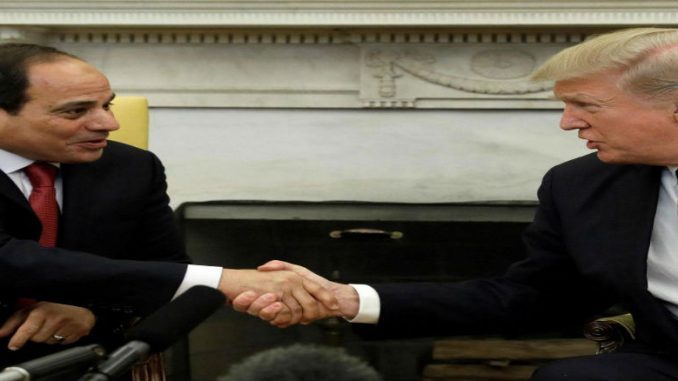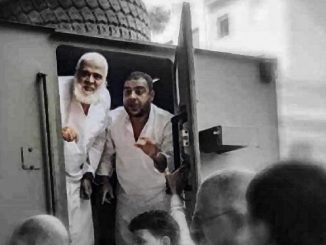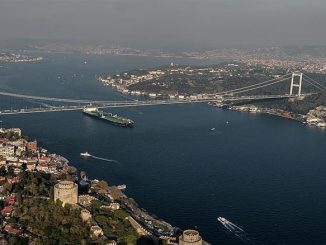
There are more than 15 US nationals who have been detained in Egypt for years with no attention on the part of US President Donald Trump. On the other hand, Turkey has been beaten down for months over US Pastor Andrew Brunson’s imprisonment.
U.S. President Donald Trump mentioned pastor Brunson’s name at every opportunity, stressed how a good man of religion he is, and talked much about “working hard” for his return home. On Friday, October 12, Pastor Brunson, who was under arrest for about two years in Turkey – including house arrest – was found guilty by a Turkish court. Brunson was sentenced to three years and 1.5 months in prison by Izmir Heavy Penal Court No.2. However, his penalty was offset by his state of arrest and he was released. In accordance with the court ruling, the US pastor’s house arrest and travel ban were ended. He flew to the U.S. “We have been beaten down for months over a pastor. U.S. President Donald Trump, who is winking at the 100 million bloc votes of the Evangelicals ahead of the November elections, mentioned pastor Andrew Brunson’s name at every opportunity and mentioning what a good man of religion he is, he talked about “working hard” for his return home,” Hasan Ozturk said in an article on Yeni Sabah Turkish newspaper .
At the same time, there are more than 15 US nationals who have been detained in Egypt, according to Washington Post, but failed to receive any of Trump’s attention that the US pastor that was imprisoned in Turkey, had. “At least 16 American citizens, all of Egyptian descent, are thought to be imprisoned by Egyptian authorities, according to Mohamed Soltan, development director with the Freedom Initiative, a Washington-based human rights advocacy group that focuses on political prisoners in the Middle East,” according to a report by the Washington Post.
Following are two cases of American nationals imprisoned in Egypt:
1- American limo driver tortured and raped in Egyptian prison, rights group says
The watchdog group said Egyptian national security agents arrested and “forcibly disappeared” Khaled Hassan, 41, a limousine driver from New York, on Jan. 8 in the coastal city of Alexandria. Hassan was born in Egypt and became a naturalized American several years ago, the group said.
In the following weeks, security forces “severely beat him, gave him electric shocks including on his genitals, and anally raped him in at least two incidents, once with a wooden stick and once by another man,” Human Rights Watch said in a statement.
Egyptian authorities, responding to a letter sent by the group, denied the allegations of torture. But Human Rights Watch said independent forensic experts who reviewed footage of Hassan’s wounds found them consistent with torture. The group urged Egyptian prosecutors to open an investigation into the torture claims.
Despite efforts by Hassan’s family to get information about his whereabouts from Egyptian authorities immediately after his disappearance, it was not until May 3 that the relatives learned of his imprisonment. Egyptian authorities told Human Rights Watch that Hassan was arrested only that day.
That was also when Hassan appeared before a military prosecutor and was accused, along with hundreds of others, of joining the Islamic State affiliate in Egypt’s volatile northern Sinai province to spy on the army and plot attacks.
Human Rights Watch said Hassan spoke with the group and denied that he had joined the Islamic State. He said he was simply visiting his wife and children, who lived in Egypt, as he frequently did.
Human Rights Watch said it reviewed police reports and legal complaints filed by Hassan’s family to authorities in January and February seeking his whereabouts. A few days after his disappearance, security agents raided Hassan’s house and ordered his wife and children to leave Egypt, where they have lived for 11 years, the group said. The family is now in the United States.
Hassan is still being held in pretrial detention at Cairo’s Istiqbal Tora Prison, said Human Rights Watch, adding that he has had insufficient food and improper health care. No date has been set for his trial.
Under Abdel Fatah al-Sisi, tens of thousands have been imprisoned, including political opponents and critics, often over allegations of committing terrorism or joining outlawed groups. Human rights groups have documented widespread torture of detainees by Egyptian security forces, as well as hundreds of “forced disappearances,” in the five years since Sissi assumed leadership of the country.
At least 16 American citizens, all of Egyptian descent, are thought to be imprisoned by Egyptian authorities, according to Mohamed Soltan, development director with the Freedom Initiative, a Washington-based human rights advocacy group that focuses on political prisoners in the Middle East.
“Hassan’s disappearance and detailed allegations of torture and the government’s denials reinforce the reality that Egyptian security forces operate with impunity,” Michael Page, deputy director of Human Rights Watch’s Middle East and North Africa division, said in a statement.
“Khaled Hassan has been able to bring the gruesome details of his treatment to light, but thousands of others held in Egypt’s prisons have not been able to tell their stories,” he said.
Moustafa, who was 48 years old at the time and father of two children, was returning home to New York in five days. We had emigrated to New York years ago. We worked hard and happily settled into the rhythms of our beloved city. We became American citizens. Moustafa drove a cab for several years. Later, we started a business together.
Our families were still in Egypt and we would visit them in Cairo every summer. Egypt had witnessed great political turmoil since the Arab Spring protests in 2011. Hosni Mubarak, the dictator, had resigned. About a year later, Mohamed Morsi, the Muslim Brotherhood candidate, won the presidential election and became president.
Political trouble and opposition to Mr. Morsi was already roiling Egypt when Moustafa and I left New York for Cairo in 2013. We decided to visit our families because we were not politically involved. We assumed we would be fine as our time in the city was centered on family.
In early July, Egyptian military led by Gen. Abdel Fattah el-Sisi ousted Mr. Morsi. In the following days, members and supporters of the Muslim Brotherhood started camping and protesting in eastern Cairo near the Rabaa al-Adawiya mosque and some other sites.
What I remember viscerally about our visit was the sweltering heat in Cairo. It was hard to be outdoors, but every now and then you need to leave the house, run some errands, walk around the city.
On that fateful Aug. 14 afternoon, after Moustafa and I stepped out of the shopping mall, we found ourselves caught in a wave of terrifying violence. While we had been worrying about the best exchange rate between the Egyptian pound and the dollar, Egyptian soldiers and police had raided the camp of the protesters — mostly supporters and members of the Muslim Brotherhood and Mr. Morsi — outside the Rabaa al-Adawiya mosque, less than a mile away from the shopping mall.
Soldiers and policemen had opened fire on the protesters. We saw several people being shot. By the end of the day, more than 900 protesters were killed by the soldiers and the police, in what came to be known as the Rabaa massacre.
Before we could get out, a group of soldiers stopped us and demanded our identification papers. I instinctively handed over my Egyptian identity card. “Stay low! Don’t draw attention,” I thought. At the same time Moustafa made the opposite decision. He sought safety in his being a citizen of the United States and handed over his American passport. Moustafa saw his blue passport as a shield, his bulletproof armor, which carried the protection and the force of the United States government behind it.
The sight of Moustafa’s American passport enraged the soldier. He threw it on the ground and called him a spy. He began pounding Moustafa’s face with his fists, pushed him to the ground and stomped on him with his boots. I was shoved away. Several soldiers joined in the assault and later dragged him away.
For two weeks, we frantically searched for Moustafa. When we finally found him in Abu Zaabal military prison in a desert area outside Cairo, repeated beating had turned his face into a lump of red and blue flesh.
Moustafa was detained without a charge for more than five years. And when the Egyptian prosecutors filed a charge against him, they threw him in a case with 738 other prisoners, accusing him and others of being part of the protests and trying to overthrow Mr. Sisi’s government.
A farcical show trial plodded on for the next five years. Egyptian authorities continued holding Moustafa in a prison, where the conditions are dreadful and inhumane. The cells are filthy, infested with insects, rodents and snakes. They have no ventilation, sun or light. Moustafa and other prisoners have no access to clean water, a bed, a chair or any books.
Moustafa is living with a life-threatening absence of medical care. He is diabetic and suffers from ischemic heart disease and hypothyroidism, and has had treatment for skin cancers. The prison authorities don’t even let him refrigerate the insulin for his diabetes that the family would bring to the prison.
On Sept. 8, the Egyptian court convicted Moustafa and the hundreds of others in his case. He was sentenced to 15 years in prison. In protest, against the travesty of justice, Moustafa declared a hunger strike. We begged him not to go on strike. His health was already failing.
The hunger strike would kill him. “I know I may be able to survive for only a few weeks when I go on hunger strike,” he told us. “But I have no other option. I would rather starve to death than rot slowly and silently here in this hell.”
A year ago, Senator John McCain brought Moustafa’s case to the American public, telling President Trump that he must “demand the immediate release” of Moustafa and other Americans unjustly imprisoned in Egypt, a country that receives more than a billion United States tax dollars every year.
In January, our spirits rose when Vice President Mike Pence told President Sisi that “justice demands” his release. Ten months have passed and the Egyptian government has completely ignored Mr. Pence’s words.
After the verdict in September, Moustafa wrote to President Trump, Vice President Pence and several representatives and senators, seeking help. A citizen who believed his American passport would protect him out there in the world is now dying in an Egyptian prison.
Egyptian authorities have interpreted the silence of the United States to mean Moustafa’s country and his government have forgotten this hardworking, ordinary American man. Moustafa, who refused to eat solid food in protest, has been surviving on vegetable juice. The prison authorities have started denying him even that. He is no longer allowed to go outside and see the sky and breathe fresh air.
Moustafa is scarily weak now, a walking skeleton. His blood sugar levels are wavering dangerously; he has reported increased dizziness. They are killing him. His children miss him very badly and are living without a father’s material and emotional support — something none of us can replace despite our love for them.
President Trump calls Sisi “his great friend” and is doing nothing to save Moustafa’s life. A short phone call or a tweet from President Trump to Abdel Fattah Al-Sisi could save an American’s life.



